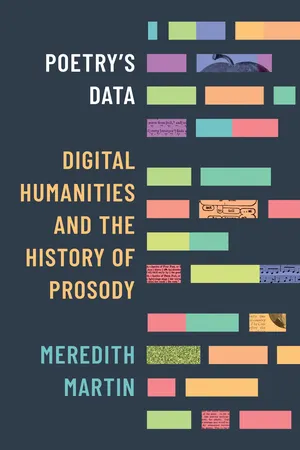
- English
- ePUB (mobile friendly)
- Available on iOS & Android
About this book
Why literary studies must confront digital mediation
We live and research in a technologically mediated landscape in which old models of reading and researching—methods that presume an autonomous, single scholar gathering resources and making claims—no longer hold. Scholars have yet to theorize either the embeddedness of their sources inside multiple layers of mediation or their own place in an information ecosystem that demands our active participation. In Poetry’s Data, Meredith Martin explores what current access to data might mean for mapping the discourse of poems. Martin’s account of her work learning about digital humanities so that she could build a database of historic prosodic materials becomes a through line in a narrative that chronicles how literature has understood poetry’s data—its sounds—from the sixteenth century to the present day.
Digital knowledge infrastructures have historical antecedents that scholars have been trained to theorize. And yet, as Martin points out, we have not been trained to identify and navigate, let alone critique, the current landscape of knowledge production. Through five chapters and five examples from the Princeton Prosody Archive, Martin shows that the histories of mediation and format are essential to the teaching of poetry and poetic form.
Frequently asked questions
- Essential is ideal for learners and professionals who enjoy exploring a wide range of subjects. Access the Essential Library with 800,000+ trusted titles and best-sellers across business, personal growth, and the humanities. Includes unlimited reading time and Standard Read Aloud voice.
- Complete: Perfect for advanced learners and researchers needing full, unrestricted access. Unlock 1.4M+ books across hundreds of subjects, including academic and specialized titles. The Complete Plan also includes advanced features like Premium Read Aloud and Research Assistant.
Please note we cannot support devices running on iOS 13 and Android 7 or earlier. Learn more about using the app.
Information
Table of contents
- Cover Page
- Title Page
- Copyright Page
- Dedication
- Contents
- List of Illustrations
- Introduction [Read Me]
- 1. How We Count [Literary]
- 2. How We Read [Word Lists and Dictionaries]
- 3. How We Classify [Linguistic]
- 4. How We Express [Typographically Unique]
- 5. How We Argue [Original Bibliography]
- 6. Coda [How to Cite]
- Appendix: Full Citation Information for PPA Sources
- Acknowledgments
- Bibliography
- Index